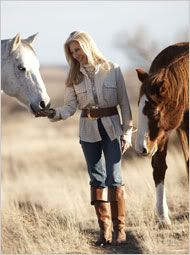By JILLIAN DUNHAM
Published: May 1, 2009
As a longtime owner of thoroughbreds, Madeleine Pickens has made the famous walk to the Churchill Downs paddock with some great racehorses. But she said she did not plan to attend the Kentucky Derby this year and had no plans to any time soon.
____________________________________________________________________________________

_____________________________________________________________________________________
Madeleine Pickens has been an advocate against the slaughter of horses with the support of her husband, the Texas oilman/billionaire T. Boone Pickens.
After hearing that Ferdinand, the 1986 Kentucky Derby winner, had been slaughtered in Japan in 2002, Pickens inquired about Fraise, her first champion at the Breeders’ Cup. Fraise’s Japanese buyers told her that the horse had been sent to a riding school — the same path Ferdinand was said to have taken on his way to the slaughterhouse.
“All the years, we’d had something like 800 horses, and it never occurred to me that there could be something like horse slaughter,” Pickens, 62, said in a recent interview. “There would be an injured horse, and I’d say, ‘What will happen?’ And they’d say, ‘The glue factory.’ I thought they were joking.”
She and her husband at the time, Allen Paulson, the founder of Gulfstream Aerospace, owned a number of Kentucky Derby starters and Breeders’ Cup champions, including Cigar, one of the most successful horses in history. Paulson died in 2000, but his widow continued in the sport with success. In 2004, her colt Rock Hard Ten finished second to Smarty Jones at the Preakness.
The next year, she met and soon married the billionaire Texas oilman T. Boone Pickens. Less than two weeks before her wedding, she received a call from Michael Blowen, the founder of a Kentucky sanctuary for rescued racehorses called Old Friends. “You don’t know me,” he told her. “But I have Fraise, and I’m bringing him home.”
He said Pickens began to cry.
Along with Fraise, the foundation was bringing back Ogygian, a Grade I stakes winner. It would cost $65,000 to fly the horses to Kentucky. “Never mind,” Pickens said she told Blowen. “I’ll pay for it.”
She had begun to pull away from the sport and decided to give it up entirely. She began instead to advocate against slaughter with the support of her new husband. They worked with the Humane Society of the United States on animal-welfare issues, including the rescue of hundreds of dogs and cats after Hurricane Katrina.
“She’s really there for animals when they are in distress,” said Wayne Pacelle, the Humane Society’s chief executive. “We consider her a fabulous ally for animal protection in this country.”
After the federal government suggested last fall that it could begin to euthanize wild horses it could not afford to manage, Pickens announced that she would create the National Wild Horse Foundation, an organization to buy and maintain a sanctuary for the animals.
To control the population, the Bureau of Land Management has rounded up nearly 80,000 wild horses and burros since 2001. Some have been individually adopted, but 32,000 remain in the agency’s custody. The cost of their care has become unsustainable, the Bureau of Land Management says, taking up three-quarters of its $36 million wild-horse budget.
Existing laws mandate that the agency euthanize healthy wild horses and sell some, including to slaughterhouses, to control costs. The Bureau of Land Management says it has not complied with those aspects of the law. But last year, the Government Accountability Office recommended that the agency begin discussions with Congress over whether to do so.
Pickens’s subsequent offer to create a sanctuary was met with enthusiasm by activists and the government. Her plan stalled, however, after she requested a federal stipend of $500 a year for the lifetime of each horse, equivalent to what ranchers who care for the horses receive in annual contracts from the government.
“She’s asking for the money ad infinitum,” said Tom Gorey, a Land Management spokesman. “We can’t do that.”
Pickens maintains that her plan will save the government at least $700 million over 10 years. Gorey called this “fantasy savings” because the proposal did not meet the requirements of the Wild Horse and Burro Act of 1971, which restricts wild horses to public land they inhabited before the law was enacted.
Senator Mary L. Landrieu, a Louisiana Democrat who is a lead sponsor of a bipartisan anti-slaughter bill introduced in March, met with Madeleine and T. Boone Pickens in January and decided to support some of the positions later put forth in a House bill called the Restoring Our American Mustangs Act, or Roam. Last week, the Committee on Natural Resources approved the act for a future House vote.
The legislation contains measures to protect wild horses, including the prohibition of euthanasia and sale for slaughter. It also endorses contraception, something the Bureau of Land Management has tried in a limited way. The Roam Act also would expand available grazing land and support public-private partnerships like the one Pickens proposes.
“It saves the horses; it saves taxpayer money,” Landrieu said. “I think that kind of effort should be honored.”
Pickens hopes to create a million-acre sanctuary that, she said, could be a “living museum” for the horses, which descend from cavalry mounts, burros brought west by Jesuit missionaries and the mustangs of the 16th century Spanish conquistadors. “If you take the horse off the range,” she said, “you now have a moral obligation to take care of that horse for the rest of its life.”
That obligation, she said, extends to the backyard horses, children’s ponies and racehorses that can wind up abandoned or slaughtered.
“We are personally responsible for these horses,” Pickens said.
A version of this article appeared in print on May 3, 2009, on page SP7 of the New York edition.









No comments:
Post a Comment